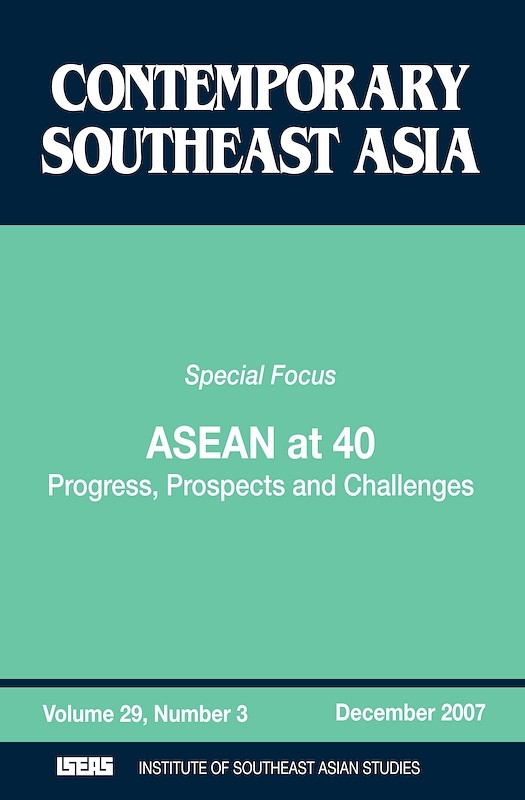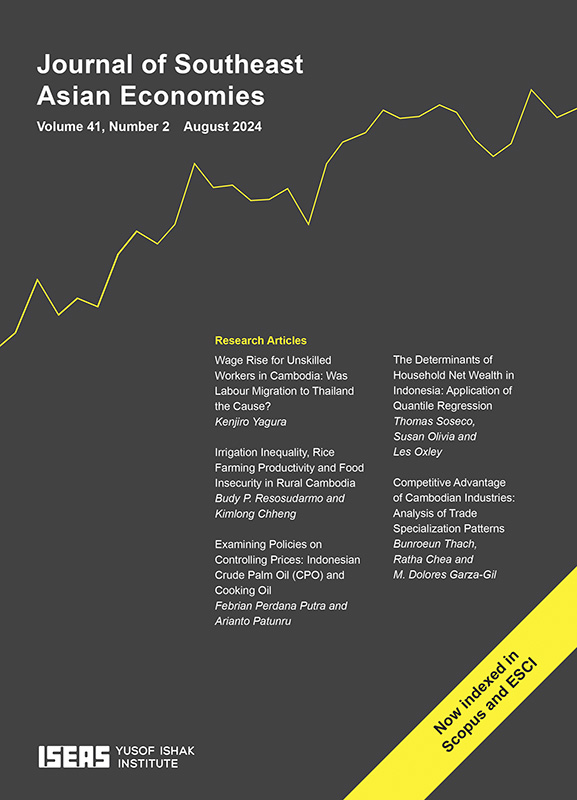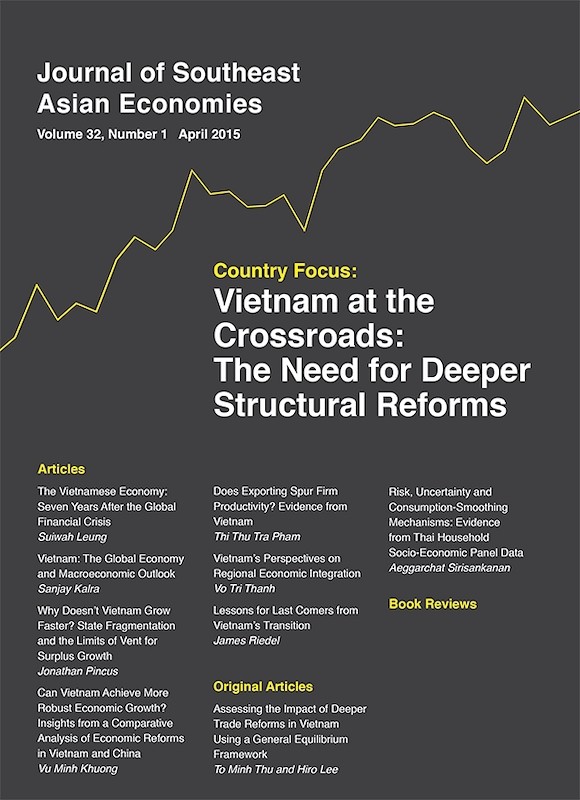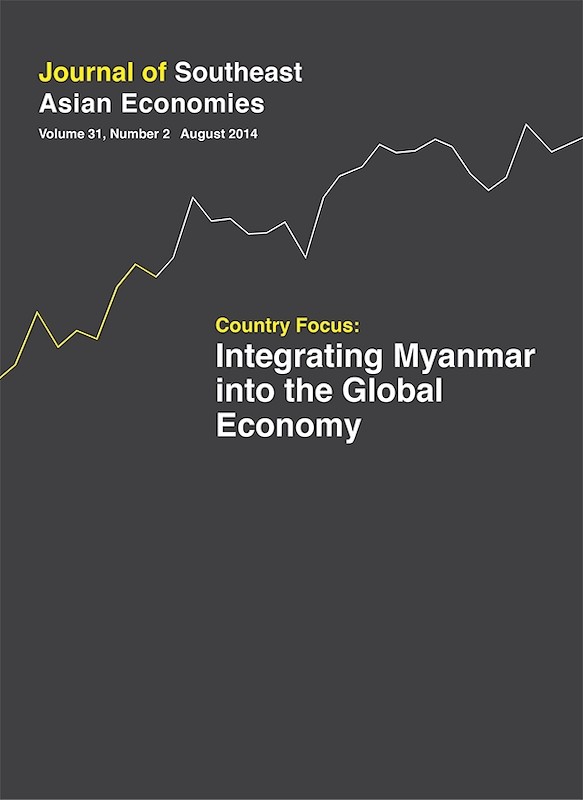Journal of Southeast Asian Economies Vol. 39/2 (August 2022)

Date of publication:
August 2022
Publisher:
ISEAS – Yusof Ishak Institute
Number of pages:
114
Code:
AE39/2
Soft Cover
ISSN: 23395095
Contents
-
Journal of Southeast Asian Economies Vol. 39/2 (August 2022)
[Whole Publication, ISSN: 23395206] -
Preliminary pages
- RESEARCH ARTICLES
-
The Impact of Governance Effectiveness on Economic Growth: Insights from the Vietnam Provincial Competitiveness Index 2007–17, by Kris Hartley, Austin M Aldag, authors see abstractProvincial Competitiveness Index (PCI) survey data and government economic data from Vietnam are used to examine the relationship between economic growth and two indicators of governance effectiveness: efficacy at working with central government drafted legislation and creativity in solving business problems. Examining all of Vietnam’s sixty-three provinces over eleven years (2007 to 2017), this study’s analysis finds a significant association between economic growth and both measures of governance effectiveness, with a stronger magnitude for more industrialized provinces. This finding suggests that efforts to improve governance effectiveness and creativity in less industrialized provinces may fail to have desired economic impact, pointing to deeper structural constraints.
-
Exploring the Correlates of Presidential Satisfaction in the Philippines Using the Misery Index, by Tristan Canare, Ronald U Mendoza, Jurel K Yap, Leonardo M Jaminola, authors see abstractNotwithstanding their widespread use in many modern democracies, surveys on leadership satisfaction have generated much debate regarding the possible factors driving public opinion. As a contribution to the literature, this study empirically examines data on Philippine presidential net satisfaction generated by the Social Weather Stations, one of the most well-established survey firms in the archipelagic country. Using Presidential Net Satisfaction data from 1998 to 2019, this study aims to show the links (or lack thereof) between survey results on citizens’ satisfaction with leadership on one hand, and objective and subjective indicators of economic well-being on the other. This study finds scant evidence that economic variables such as inflation and unemployment are tied to presidential satisfaction, despite the primacy of the economy in Philippine surveys of key policy issues.
-
Democratic Reforms and Trade: Evidence from the European Union’s Generalized System of Preferences for Myanmar, by Kiyoyasu Tanaka, Toshihiro Kudo, authors see abstractThe European Union (EU) re-instated the Generalized System of Preferences (GSP) for Myanmar from 2013 following the newly established “democratic” government in 2011. This paper highlights a series of democratic reforms in Myanmar as a key driver of the EU’s GSP re-instatement. We estimate the causal impact of duty-free access on Myanmar’s exports by exploiting the fact that the GSP re-instatement corresponded to a removal of Most-Favoured-Nation tariff rates in the EU market, which was plausibly exogenous for industries in Myanmar. The results show that the GSP re-instatement had a significantly large positive effect on Myanmar’s exports, with the most pronounced impact on the volume of garment exports. The EU’s GSP played a key role in linking democratic reforms to subsequent trade growth in Myanmar.
-
Transformation and Sources of Growth in Southeast Asian Agriculture, by Pratap S Birthal, P K Joshi, Devesh Roy, Ghanshyam Pandey, authors see abstractOver the past few decades, agriculture in Southeast Asia has experienced robust growth and undergone a significant structural transformation, albeit at a different pace in different countries in the region. This paper aims to understand the process of agricultural transformation and growth in Southeast Asia. The findings of this study show that, driven by technological change, area expansion and diversification, agriculture has grown faster in low-income countries in the region. In contrast, agricultural growth in high-income countries has been slow and driven by price increases, mainly of export-oriented commercial crops such as oil palm, rubber and coconut—alongside expansion of cropped area under these crops. In view of the fixed supply of land and high volatility in global food prices, the area- and price-driven growth is not sustainable in the long run. For efficient, sustainable and inclusive growth, exploiting the potential of existing and frontier technologies and diversification of production portfolio holds greater promise.
-
Industrial-Led Economic Development of Cambodia: Implications for Low-Income Developing Countries, by Jai Sheen Mah, author see abstractSince the early 1990s, Cambodia has recorded rapid economic growth, which has been accompanied by export expansion, FDI inflows and industrialization. The garment industry has, by far, led the development of the manufacturing sector. Moreover, the government has pursued an industrial policy that emphasizes the role of the labour-intensive manufacturing sector. The country needs to improve the level of its human capital which is essential to achieve sustainable long-term growth driven by technologically advanced industries.
- POLICY NOTE
-
Implementation of Cooperation Chapters in Trade Agreements: Case Linked to the IA-CEPA, by Nathan Gray, Janne Laukkala, Christopher Findlay, authors see abstractChapters on economic cooperation are increasingly evident in trade agreements. The principles are clear but the mechanics are not. This paper presents a case study of a relevant project linked to the IA-CEPA which focuses on impediments to trade associated with differences in regulatory systems. It explains the procedures adopted and identifies a number of outcomes. Implications are identified for the design of future projects relevant to cooperation chapters, and for the application of concepts discussed elsewhere in the literature that are relevant for reducing impediments to trade in the context of global value chains.
- BOOK REVIEWS
-
BOOK REVIEW: 50 Years of CSIS: Ideas and Policy in Indonesia, by Peter McCawley., by Steve Grenville, author
-
BOOK REVIEW: The Political Economy of Automotive Industrialization in East Asia, by Richard F. Doner, Gregory W. Noble and John Ravenhill, by Tham Siew Yean, author

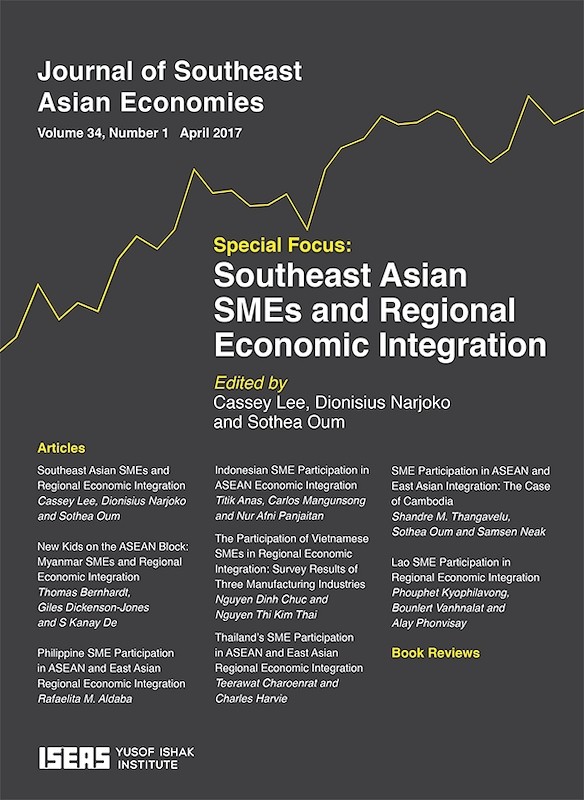
![Journal of Southeast Asian Economies Vol. 30/1 (Apr 2013) [formerly ASEAN Economic Bulletin]](/cover/AE30-1.jpg)
